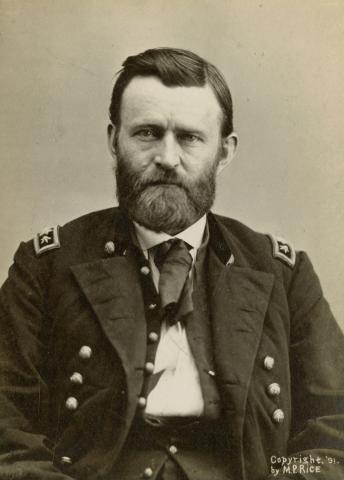The Reconciliation of the Blue and the Gray
In 1861, our ancestors were facing a war, the most costly in American lives in our history. Four years later the war was over, but the scars would remain for many years. The dispute over the right of secession was ended and the country had to undergo the difficult process of reconciliation. The North and South had to learn to live and work together and to strengthen national unity. The leading group in this process of reconciliation was the veterans themselves. It might seem strange that men who had fought against each other for four years, who had seen and felt all the horrors of the war, would be the first to reunite with their former enemies, and that these ties would be the strongest. Yet, if we understand the nature of the war, we can understand this spirit.
Brother had fought against brother, not out of personal hatred, but for opposing principles or interpretations in which they sincerely believed. The outcome of the war ended this dispute, it was accepted and people adapted to it. Once the issue was settled, people could reunite in friendship. For some, this was hard or impossible to do. The war had ravaged property, broken up families, and destroyed lives. Some could not forget the war which had left a chair in their home empty and placed its former occupant in a grave. We cannot condemn these people, instead we sympathize with them for their human feelings. However, it was different for the veterans. In fighting against a formidable opponent for four long years, they learned to respect that enemy. Although opposed to his cause, they admired his steadfastness and bravery, his courage and devotion. They could sympathize with his feelings, for both armies experienced many hardships entailed in military service.
Both Union and Confederate soldiers had suffered from fatiguing marches, heat and cold, and scarcity of food. They had tasted of battle and seen their friends fall all about them. They knew that the enemy had seen the same. Even in the midst of battle men often cheered a brave deed of their foe, and men of both sides risked their lives to help the wounded enemy. And so, after the smoke of battle had cleared, they could indeed be friends. We often read of enemy pickets exchanging coffee, tobacco, and gossip between the lines. They often said that if the politicians could be forgotten and the issues left up to the soldiers, they could settle them without a single shot. After all, whether Union or Confederate, they were all Americans and sprang from the same seed.
In the decades after the war, many poems were written about the spirit of reconciliation, "Two Brothers" was written by a black American poet, a son of slaves, named Paul Laurence Dunbar. The poem tells the story of two brothers who grew up together, yet had different beliefs and fought on opposing sides in the War Between the States "...And she prayed for both as mothers pray, for the one in blue and the one in gray. For they could not think alike, and so they parted, grieving: each to go and add his little tithe of might to help uphold what he deemed right. Each did the right as right he knew, what more could saints or angels do? And one come back, and one was left where fleet death wove his crimson weft. For both were brave: since this is true, what matters it about the hue of coats they wore into the fray? Brave hearts beat 'neath both blue and gray."
Source : United Daughters of the Confederacy Magazine.
- Log in to post comments

